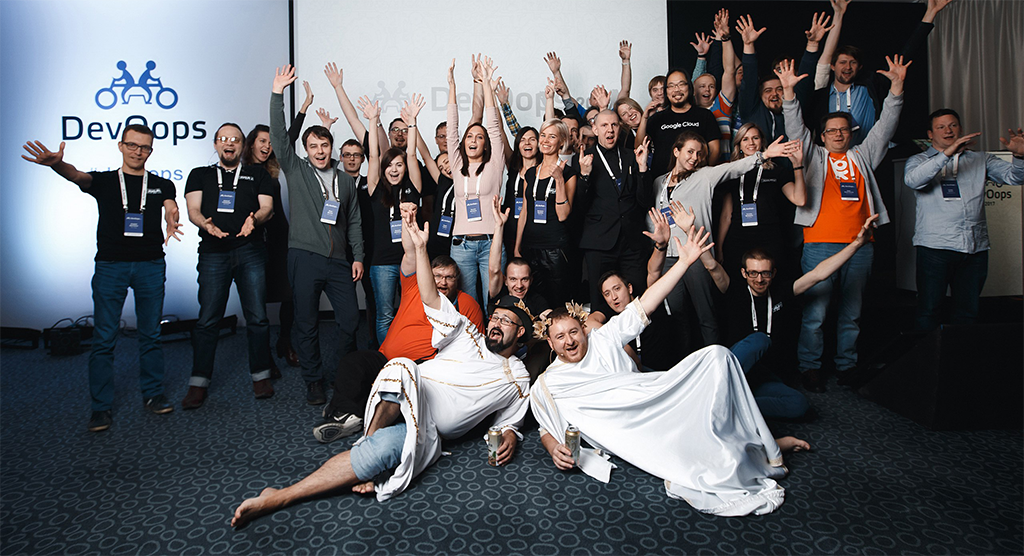
It has been at least a few years since the word "DevOps" became widely known. Who just did not implement it, and what just did not.
Meanwhile, the area is very unexplored, concealing many discoveries. For example, in the Russian-speaking community they are still undecided on terminology: some people are already hiring people for the position of “devops”, while others always say that “devops” is a culture and practice designed to combine development, operation and something else, therefore, to call such a position is incorrect.
Many are looking for an answer in the books, the benefit of which many have appeared lately. For example, the Devops Handbook, written by our speaker, John Willis, and Google SRE Book, which is available on the Internet for free, seem to be one of the most significant for me. However, reading these books, I discovered the following thing: a dry text is not very suitable for the transfer of knowledge, very strongly based on the real work of living people. It turns out too abstract knowledge.
For example, we take the 14th chapter, "Managing Incidents" . Two examples are given to us: first, the story of a single incident, which was not properly understood, is colorfully told. Then the same story is told, but with the right structure and good outcome. A good outcome comes when important practices are followed:
- A clear division into roles, with the allocation of responsibility for:
- the entire incident (“commander”);
- operations-part;
- communication;
- work planning;
- The selection of the command post (both physical and just chat);
- A constantly updated document describing the current state of the incident;
- Timely and clear procedure for the transfer of authority (for example, at the end of the shift).
In the end, another pack of good advice about everything is given. In principle, it is good, but there is a question: how to put all this into practice? Each item is suitable for a whole book, and some of them require such soft-skills, which are not very well described in books. Imagine that in the middle of the incident, the CTO resorts to you and starts handing out useless advice from the past IT life: he will suggest increasing the size of memory pages in Linux, although it’s completely different, or turning off the barriers on ext4, although caching is turned on. Is it so easy to kick him out of our team post on the pretext that he has no role in the team? How did the one who wrote the article?
Ideally, I would like the following: first, to have more than one point of view on the same problem, including that obtained from the experience of various teams. Not all companies are like Google. Even so: companies like Google can be counted on the fingers. Secondly, I want to meet with the authors of this sacred knowledge live, look into the eyes and ask a few questions. For example, many writers of laudatory documents about the wonderful devops in their organization simply lie, but in fact they have bash scripts and sticks glued together on duct tape inside. It is very useful to look into the eyes. And I really want to get not just some generalized advice, but to ask my own tricky questions and get answers.
The issues of many points of view and different problems are not solved in any way by small meetings. With the help of books you can not dig deeper and talk heart to heart. Questions such as practical terminology, no one has yet clearly decided, the composition of the vacancies depends on the conjuncture. In order to receive actual and useful knowledge, it is possible and necessary to use all resources at the same time.
Last year, we realized that everything had become so confusing that it was time to put together a big DevOps conference and only him. It is called DevOops and takes place in the fall in St. Petersburg. Next time it will be held on October 14 of this year.
A large conference is exactly what solves most of the stated problems. For example, if you misunderstood something in the book of John Willis, you can not only go to his report and understand the topic in more detail, but also meet him in the discussion area and ask questions directly.
Only about DevOps
First, the feature is that this conference is only about DevOps. In principle, at most large IT conferences in Russia now there are a couple of devops topics. If you go directly to the conference stack, you can get a good base. But they will have to listen to a ton of everything that programmers in Java, .NET, JavaScript, and so on have become painful, and usually - without any sense. But all this is insanely long and insanely expensive. The DevOops conference focuses solely on DevOps and thus solves a lot of annoying organizational problems.
They will talk about containers and their orchestration, virtualization and clouds, monitoring and auditing, CI and CD, and in general everything that comes to mind when the word “DevOps”.
Speakers
But the most important thing is the speakers. Already, at the time of the conference announcement, there were nine people from companies like Google and Microsoft ready to share their experience. In the end, the program will be about 17 reports in three tracks. Perhaps the tracks and reports will be even more. We carefully reviewed your feedback from the previous DevOops and tried to invite those you most wanted. Let's see who is already with us.
John willis
 It is impossible to convey in words how cool it is that he comes to us. John is one of several DevOps fathers, the author of 10 books published over the past twenty years, including the well-known DevOps Handbook and Beyond the Fenix Project , Ops gurus for 35 years and just a living legend.
It is impossible to convey in words how cool it is that he comes to us. John is one of several DevOps fathers, the author of 10 books published over the past twenty years, including the well-known DevOps Handbook and Beyond the Fenix Project , Ops gurus for 35 years and just a living legend.
Seth Vargo
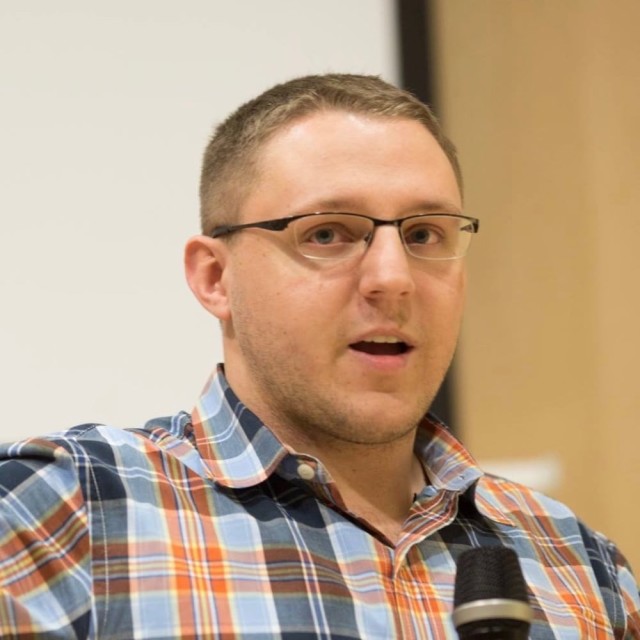 Set - Developer Advocate in Google, and before that worked in HashiCorp, Chef Software, and other places. You may have read his book Learning Chef or have already met at conferences.
Set - Developer Advocate in Google, and before that worked in HashiCorp, Chef Software, and other places. You may have read his book Learning Chef or have already met at conferences.
His report is called Modern Security with Microservices and the Cloud . The importance of security in microservice applications is difficult to overestimate, and this makes the Seth report particularly relevant. The report will include a description of the basic principles of security and best practices in modern systems based on microservices, and there will also be a live Vault demo as an example of their use.
Liz Rice
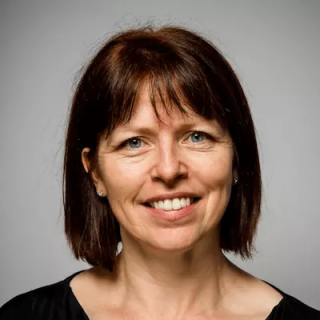 Technical evangelist at Aqua Security, head of the KubeCon Program Committee, making the best keyouts at conferences around the world.
Technical evangelist at Aqua Security, head of the KubeCon Program Committee, making the best keyouts at conferences around the world.
Initially specializing in software development (in particular, cross-platform implementation of the network stack), Liz is well versed in Kubernetes, Go and Python (the profile on GitHub clearly shows that she is not one of those evangelists who forgot how to code), writes posts on Medium ( because she does not have an invite to Habr! ) and has a bunch of specific skills like live coding .
Liz is going to come with a report on "Practical steps for securing your container deployment" , the essence of which is that when she enters the DevOps culture, security somehow becomes the responsibility of everyone in the team. Specific things will be demonstrated about how safety principles are ensured at all stages of the CI / CD pipeline and what exactly needs to be done by hand.
Jessica dean
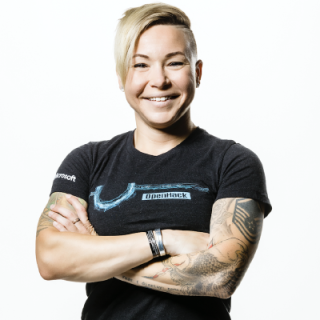 Jessica is a representative of the Microsoft Cloud developer community, specializing in Azure, infrastructure, and containers. And also, she knows a lot about GNU / Linux and Open Source - tell me five years ago that I would write about a person from Microsoft, I would have laughed.
Jessica is a representative of the Microsoft Cloud developer community, specializing in Azure, infrastructure, and containers. And also, she knows a lot about GNU / Linux and Open Source - tell me five years ago that I would write about a person from Microsoft, I would have laughed.
Prior to joining Microsoft, she spent more than a decade working with end users in San Francisco as an IT consultant and system administrator for enterprise environments.
Jessica has been holding the Microsoft Most Valuable Professional rank in the “Windows and Devices for IT” category for 4 years (in the Microsoft world, this is quite an important thing). Of course, she has a ton and other certifications. In particular, in 2013, she received FEMA certification from the US Department of Homeland Security (Homeland Security) as a leader during crises and emergencies.
She is also engaged in crossfit and just physically very pumped. You can discuss with her at a party a bunch of questions and not on the topic of devops. We should not forget that speakers are not just abstract sources of knowledge on one narrow topic, but also very versatile personalities who have something to learn in very different fields.
Paul Stack
 Paul is an infrastructure developer who previously worked at HashiCorp and participated in the development of tools used by millions of people (for example, Terraform). He often speaks at conferences and communicates practice from the leading edge of CI / CD implementations, the principles of proper organization of operations-parts, and is able to clearly communicate why administrators do this at all.
Paul is an infrastructure developer who previously worked at HashiCorp and participated in the development of tools used by millions of people (for example, Terraform). He often speaks at conferences and communicates practice from the leading edge of CI / CD implementations, the principles of proper organization of operations-parts, and is able to clearly communicate why administrators do this at all.
Paul had already spoken at the previous DevOops, and the conference participants liked him so much that we decided to invite him again!
Record of the previous report can be found here:
This time the report will be completely different. Its essence is that we build reliable fault-tolerant systems - but how to make sure that the system is really reliable? We have a choice: wait for the incident and repair it in case of a fire or add incidents by ourselves until we learn to survive. Can't beat the incidents? Then lead them! Paul promises to show how to add Chaos to your infrastructure and how to resist it.
Alyona Proharchik
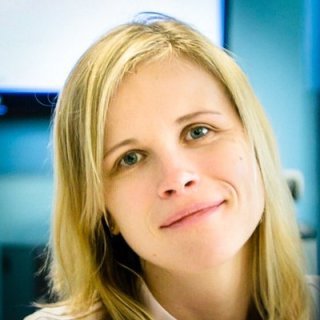 Alena is the Principal Software Engineer at Rancher Labs (yes, those are the guys who made Rancher , whose slogan sounds like “Kubernetes Everywhere”) and the Project Management Committee at the Apache Software Foundation. I used to work on building infrastructure services for virtual machines in the CloudStack project, and now, as you might guess, for containers with an emphasis on Kubernetes. This is a person who not only knows everything about Kubernetes, but can also tell about him, taking top places at conferences.
Alena is the Principal Software Engineer at Rancher Labs (yes, those are the guys who made Rancher , whose slogan sounds like “Kubernetes Everywhere”) and the Project Management Committee at the Apache Software Foundation. I used to work on building infrastructure services for virtual machines in the CloudStack project, and now, as you might guess, for containers with an emphasis on Kubernetes. This is a person who not only knows everything about Kubernetes, but can also tell about him, taking top places at conferences.
Her report is "Building a platform for managing multiple Kubernetes clusters: pitfalls and solutions . " The bottom line is that if it was once difficult to work with k8s in a cluster, now this is a resolved question, and the work has moved into the area of managing multiple clusters. Concrete problems and solutions will be considered, not confirmed by abstract reasoning, but by examples of their solution when developing Rancher. But this is not a report about Rancher as a product, but about the experience gained, which engineers may need both dev and ops. If you don’t know why a company should have more than one Kubernetes cluster, then you should go to this report.
Anton Weiss
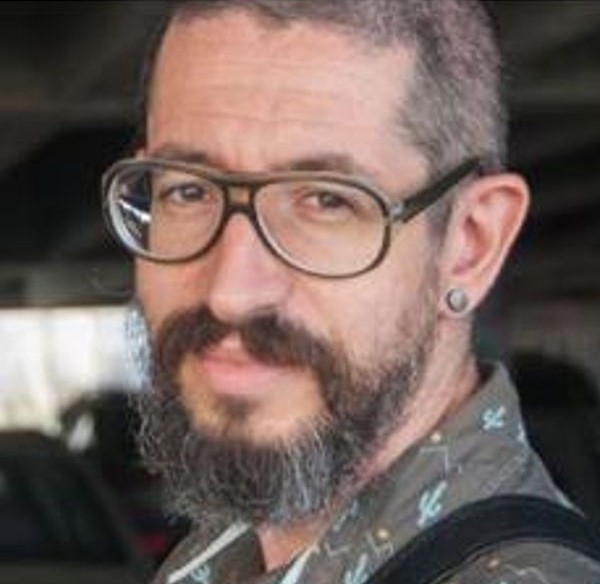 Anton Weiss is a co-owner of technology consulting Otomato Software, owner of more than 15 years of experience in the field of high technologies. He is an expert in technical teaching, initiator and co-author of the first in Israel course of devops certification. Anton participates in international conferences and is known as a cool speaker.
Anton Weiss is a co-owner of technology consulting Otomato Software, owner of more than 15 years of experience in the field of high technologies. He is an expert in technical teaching, initiator and co-author of the first in Israel course of devops certification. Anton participates in international conferences and is known as a cool speaker.
This time Anton will come to us with the report “DevOps for dinosaurs: how to change processes, approaches and thinking in a traditional company” . Over the past three years, Otomato has conducted DevOps Transformation projects in several large international companies. Helped with the transition to new technologies, cloud infrastructures and continuous delivery processes.
But the main thing - they changed the models of cooperation and information flows.
It was not easy, not everything worked. Much took much more time and effort than desired. This report is based on real experience. In it, Anton will consider everything that they have learned, and will tell you what works, what does not work, what needs to be done first, and what then, and what you should first pay attention to.
Anton Babenko
 Many people know and use Terraform in their daily work. But so far, best practices have not been formed for Terraform. Each team has to invent its own approaches and methods.
Many people know and use Terraform in their daily work. But so far, best practices have not been formed for Terraform. Each team has to invent its own approaches and methods.
Anton leads the Terraform AWS community modules collection on GitHub ( terraform-aws-modules , by the way, more than a million downloads!) And knows everything about Terraform’s long-term production. He is ready to share his valuable experience with us. How should I write TF-modules so that it does not hurt.
Alexander Titov
 Alexander is the organizer of the DevOps Moscow community and DevOpsDays Moscow conferences.
Alexander is the organizer of the DevOps Moscow community and DevOpsDays Moscow conferences.
As a managing partner at Express 42, he now grows DevOps in technology companies. Prior to that, he was the technical director of the first cloud hosting in Russia - Scalaxy, and before that he went through a fascinating way of acquisitions together with Qik, the way from exploiting a fast-growing startup to operating at a large international company Microsoft.
Kirill Tolkachev ( @tolkv )
 This is one of the speakers that the audience really wanted. Perhaps you know him as a co-founder of “Two Devs One Ops” - an extremely subjective and awesome podcast about DevOps and the modern stack. Or as a permanent resident of the podcast "Debriefing" , or from stories and reports about Groovy, Gradle, Spring and the Netflix technology stack.
This is one of the speakers that the audience really wanted. Perhaps you know him as a co-founder of “Two Devs One Ops” - an extremely subjective and awesome podcast about DevOps and the modern stack. Or as a permanent resident of the podcast "Debriefing" , or from stories and reports about Groovy, Gradle, Spring and the Netflix technology stack.
Until recently, Cyril acted as the main developer at the Alpha Laboratory and developed banking APIs, creating principles and toolkits for working with microservice architecture. The DevOps methodology knows firsthand and has four years of experience in its application. Now Cyril is encrypted, but he probably has something to share.
Baruch Sadogursky ( @jbaruch ) and Leonid Igolnik

This will be a joint report of our great friends and some of the best keynoteers at the conferences of the JUG.ru Group. Details about the report is still unknown, so there is plenty of time to enjoy the intrigue.
In the past DevOops, they made a chic closing keyout, which can be seen here:
For those who do not know (there are such?), Baruch - developer advocate at JFrog and does exactly 3 things in life: hangs with developers, users and clients, writes code for them and talks about impressions on blogs and conferences - such as DockerCon, DevOps Days, Container World, JPoint and Joker, and many others. And so more than ten years in a row, not a minute of regret.
Leonid is a business angel and a service station for a large company in Silicon Valley, where he manages the development of SaaS applications in the field of enterprise security. Throughout his career, he has been engaged in online applications, having started it in one of the first Internet service providers in Israel. Obviously, Leonid is well acquainted with the development, management, and administration of large-scale projects.
Call for Papers
Do you have an interesting topic for a report? Want to take part in a contest against bison such as Seth Vargo and Liz Rice? So it's time to apply! The SFP closes at a tremendous speed, until August 14th there is very little time, and only a few places are left in the program. Apply now .
Next steps
DevOops 2018 will be held on October 14, 2018 in St. Petersburg.
Further acquaintance with the project can be continued on the site . Pay attention to the subscription form on the main page: the news will definitely be.
We are waiting for you at DevOops 2018! It will be great!